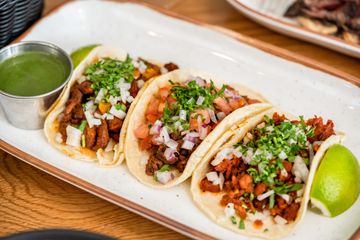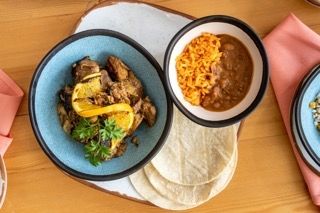Is Mexican Food Healthy And Balanced? Unpacking the Nutritional Perks of Typical Ingredients
The concern of whether Mexican food is healthy and balanced invites an exploration of its standard active ingredients. Beans and corn work as fundamental staples, rich in healthy protein and fiber. Avocados give useful fats, while different natural herbs and spices include taste and wellness benefits - mexican food. With each other, these elements develop a tapestry of nourishment. The healthiness of Mexican food typically depends on prep work methods and portion dimensions. What duty do these factors play in identifying its total dietary value?
The Power of Beans: Healthy Protein and Fiber-Rich Staples
Typically neglected, beans offer as a cornerstone of Mexican cuisine, providing a riches of dietary benefits. Rich in healthy protein, they are a superb plant-based choice for those seeking to fulfill their nutritional healthy protein needs. This high healthy protein material sustains muscle repair service and growth, making beans very useful for both meat-eaters and vegetarians alike. In addition, beans are a remarkable source of nutritional fiber, which helps in food digestion and promotes a sensation of fullness, possibly aiding with weight management.
The range of beans utilized in Mexican meals, such as black beans, pinto beans, and kidney beans, adds to a diverse flavor profile and can boost meals nutritionally. Beans are reduced in fat and contain necessary vitamins and minerals, including folate, iron, and magnesium. With each other, these attributes make beans a vital component, providing both nutrients and food in standard Mexican price.

Corn: a Versatile Grain With Nutritional Benefits
Corn attracts attention as a functional grain essential to Mexican cuisine, celebrated not just for its culinary applications however likewise for its remarkable dietary account. As a key component in dishes like tortillas, tamales, and pozole, corn provides essential nutrients that add to a balanced diet. Rich in carbs, it acts as a considerable energy resource, while likewise being reduced in fat, making it a favorable choice for numerous dietary needs.
Corn is a great resource of nutritional fiber, which aids in digestion and advertises satiation. It has considerable amounts of vitamins such as B-complex vitamins, which are essential for basal metabolism. The existence of antioxidants, specifically carotenoids, adds to total wellness by lowering oxidative stress and anxiety. Furthermore, corn is gluten-free, dealing with those with gluten level of sensitivities. On the whole, the nutritional benefits of corn emphasize its importance in typical Mexican food and its role in a healthy and balanced diet.
Avocados: Healthy And Balanced Fats and Nutrients in Every Bite
Avocados play a considerable role in Mexican food, enhancing dishes with their creamy structure and abundant flavor. Beyond their cooking charm, avocados are commemorated for their excellent dietary account. They are a rich source of healthy and balanced monounsaturated fats, which can aid lower bad cholesterol levels and support heart health and wellness. Furthermore, avocados are packed with necessary nutrients, consisting of potassium, vitamin E, and B vitamins, adding to overall health.
The high fiber material in avocados help food digestion and promotes satiety, making them a useful enhancement to any type of meal. Their one-of-a-kind nutrient structure can also sustain skin health and provide anti-inflammatory benefits. Integrating avocados into traditional Mexican meals or appreciating them as a standalone treat can improve both taste and nutrition, demonstrating why they are a cherished staple in Mexican food. On the whole, avocados offer a scrumptious method to take pleasure in healthy fats and crucial nutrients in every bite.

Natural Herbs and spices: Flavorful Wellness Boosters
While appreciating the abundant tastes of Mexican food, one can not overlook the important function that spices and natural herbs play in improving both taste and health. Components such as cilantro, chili, and oregano peppers not just add to the vibrant taste profile however also provide substantial health and wellness advantages. Cilantro is understood for its detoxifying residential properties, assisting to eliminate hefty steels from the body, while oregano is Read Full Report loaded with anti-oxidants and has anti-inflammatory results.
Chili peppers, a staple in many Mexican recipes, include capsaicin, which has been connected to improved metabolism and discomfort relief. Additionally, seasonings like cumin and coriander assistance digestion and might assist in blood sugar level policy. Incorporating these flavorful health and wellness boosters into dishes not just improves the culinary experience yet likewise advertises general wellness, making Mexican food not simply tasty, however likewise nutritionally advantageous.
Traditional Food Preparation Approaches: Enhancing Nutrition and Taste
Traditional food preparation methods in Mexican cuisine play a vital role in boosting both nourishment and Read More Here taste, as they frequently focus on time-honored methods and fresh components. Strategies such as nixtamalization, where corn is saturated and prepared in an alkaline solution, not just boost the nutrient account of tortillas yet likewise improve their digestibility - tacos. Additionally, the usage of slow food preparation methods, like stewing or braising, enables flavors to meld magnificently while retaining the stability of the components

Often Asked Inquiries
Are Mexican Food Portions Usually Larger Than Other Cuisines?
Mexican food parts are often bigger than those of many various other cuisines. This particular shows traditional dining practices, stressing common sharing and hearty dishes, which can lead to a much more significant serving dimension overall.
Just how Does the Prep Work Technique Affect Healthfulness of Mexican Food?
Prep work techniques significantly influence the healthiness of Mexican food. Methods such as barbecuing or steaming protect nutrients, while frying can raise unhealthy fat content. Choices of active ingredients and cooking styles ultimately establish overall dietary worth.
Can Mexican Food Be Tailored for Certain Nutritional Constraints?
Mexican food can without a doubt be tailored for particular nutritional constraints. Replacements, such as utilizing corn tortillas for gluten-free diet regimens or integrating even more veggies, enable individuals to delight in standard tastes while fitting different nutritional requirements.
What Prevail Misunderstandings Concerning Mexican Food and Health?
Common mistaken beliefs concerning Mexican food consist of the idea that it hop over to these guys is inherently undesirable, excessively spicy, and exclusively focused on fats. In truth, typical dishes usually feature nutritious components and can be tailored to various dietary requirements.
Are There Healthier Alternatives at Mexican Restaurants?
Healthier options at Mexican dining establishments often consist of smoked meats, beans, and fresh veggies. Selecting recipes that emphasize whole components and avoiding heavy sauces can bring about a more nourishing eating experience, promoting general health.
The range of beans utilized in Mexican recipes, such as black beans, pinto beans, and kidney beans, adds to a varied taste account and can boost dishes nutritionally. Avocados play a considerable role in Mexican cuisine, enhancing dishes with their luscious appearance and abundant taste. Incorporating avocados into conventional Mexican recipes or enjoying them as a standalone treat can improve both taste and nourishment, demonstrating why they are a precious staple in Mexican food. While taking pleasure in the abundant flavors of Mexican food, one can not neglect the important role that spices and herbs play in boosting both preference and health. Traditional food preparation approaches in Mexican food play a vital role in boosting both nutrition and taste, as they often prioritize time-honored techniques and fresh components.